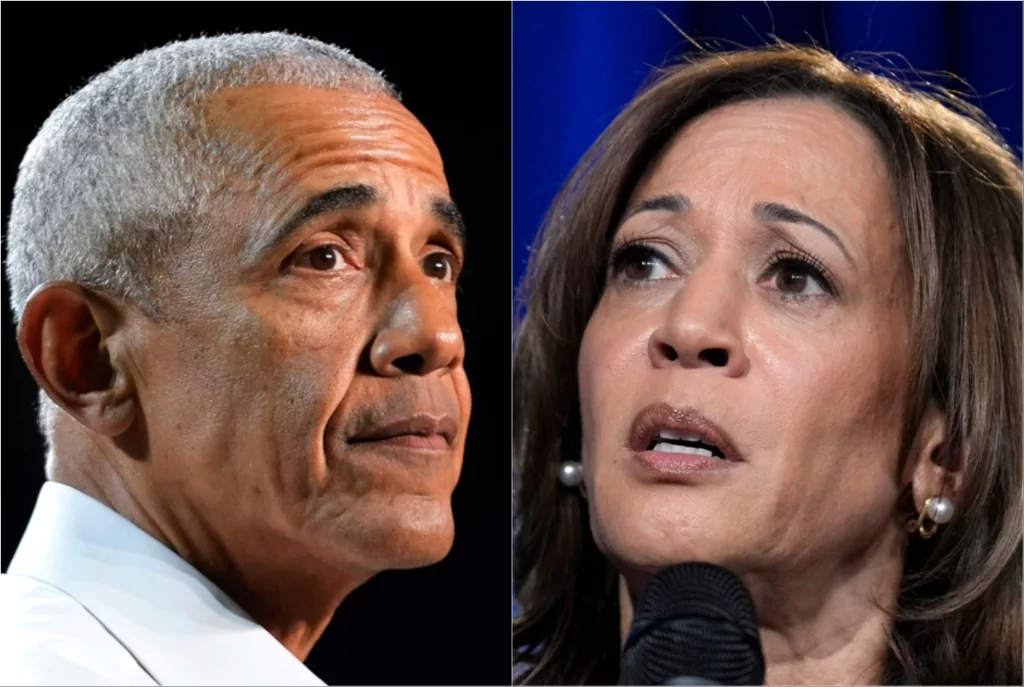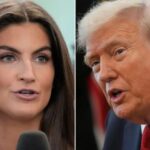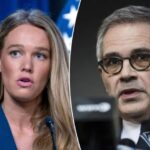

The vibes are low, and the “joy is gone” from Vice President Kamala Harris’s campaign if Republicans are to be believed.
But on Thursday night, in Georgia, she will play her trump card, if you will, as she steps out onstage with former president Barack Obama for the first time since accepting her party’s nomination.
Obama, still the standard bearer for the Democratic Party, has been a powerful Harris surrogate, stepping up his appearances in recent days as her momentum flags, particularly among black men.
Harris is now seeking to harness the Obama magic, the culmination of a long relationship that has been defined by years of mutual back-scratching. Their overlapping, intertwining, and often arms-length relationship could result in another historic win for Democrats and a new power dynamic. It could also spell trouble for Harris’s campaign.
Here is a history of some of their key moments
Obama’s spotty record and unrivaled control
The precise moment the two first crossed paths is murky. They have been in each other’s orbit since as early as 20 years ago, but the pair’s relationship can largely be traced back to Christmas 2008. Following the holiday period, Harris, then the district attorney of San Francisco, pulled on her snowsuit to travel to Iowa and knock on doors for the then-long-shot presidential candidate.
Instead of trying to launch former Secretary of State Hillary Clinton through the glass ceiling of the presidency, Harris chose to brave the elements to support Obama. A year earlier, Harris made a trip to Illinois to see Obama announce his run for the White House. She wasn’t backstage or with his team to the side. She stood in the crowd, one of the true believers.
Obama’s grip on the Democratic Party has been unrivaled since he defeated Clinton in 2008. His eight years in the White House are viewed by Democrats as some of the most momentous in the party’s history. They are happy to overlook the drubbing the party took under his leadership.
The numbers don’t lie: in 2008, Democrats had a supermajority in the Senate of 60 seats, and they held 257 seats in the House. By 2016, those numbers shrank to 46 and 188, respectively.
Democrats lost their grip on state legislatures and governors’ mansions too. There were nine fewer Democratic governors when Obama left office than in 2009, and Democrats hadn’t been so unrepresented in elected offices nationwide since the 1920s, according to NPR.
But Obama was a star. He was an oratorical master who infuriated Republicans and energized the professional wing of the Democratic Party. Even after he tapped Clinton as his preferred successor in 2016, ahead of his former rival-turned-Vice President Joe Biden — a decision that likely helped Donald Trump’s ascension — there was no consideration that any Democrat was more popular or powerful than Obama.
The former president has flexed that power despite largely keeping out of the spotlight. He was slow to give his seal of approval to Harris in July after Biden dropped out of the race. There were reports Biden forced Obama’s hand to back her, with the president endorsing Harris as a final act of power and revenge for being spurned in 2016.
But the Obama-Harris relationship has been more cordial, if less confidential, than his union with Biden ever was. Even if there were lingering doubts about whether Harris would win a “mini primary” after Biden’s exit, she has shown immense improvement as a politician compared to when they first met.
A long history
Fast forward past the snow-covered Iowa porches of 2008. The hard work Harris put in for Obama, which sent him to the White House on slightly more than half a term in the Senate, paid dividends.
When she was caught in a pitched battle for California Attorney General, Obama swooped in to offer her the first of several hands up as she climbed the political ladder.
Harris has scarcely had to run against Republicans due to California’s “jungle” primary system that pits each candidate against the other with the top-two vote getters moving on to the general election ballot in November. In deep-blue California, Republicans pose little threat, as no Republican has won statewide office there since 2006, when Arnold Schwarzenegger became the governor.
Even with Obama’s endorsement in 2010, Harris nearly lost the attorney general contest to Republican Steve Cooley. A handful of third-party candidates hoovered up 6.5% of the vote, but she edged out Cooley by half a percentage point.
Obama called Harris a “dear, dear friend” during his appearance in Los Angeles on Oct. 22, 2010, though it isn’t clear how often their paths had crossed since her door-knocking days in Iowa.
Harris had already spent the last year being referred to as the “female Barack Obama,” a moniker first bestowed on her by journalist Gwen Ifill in 2009 on the Late Show with David Letterman.
New York magazine reported Obama has been skeptical about the comparison, believing it was superficial, though it hasn’t stopped him from intervening at key moments to tip the scales in her favor.
DNC invite puts Harris on the map
The next time Obama offered Harris a hand, it came with a request: She had made history as the first black and South Asian woman to be attorney general of California; he made history by being the first black president of the United States; would she help him get reelected?
Harris was invited to speak at the 2012 Democratic National Convention. She had made a name for herself out West fighting big banks in the wake of the financial crisis. When she took the stage in North Carolina, she hammered Mitt Romney, then the GOP candidate, as willing to “roll back the rules” that she had fought to enforce as attorney general and touted her own victories against the banks, making sure to include Obama’s role in all of it.
“President Obama stood with me and 48 other attorneys general in taking on the banks and winning $25 billion for struggling homeowners,” she said. “That’s leadership. That’s what President Obama did. And that’s why we need to give him another four years.”
That speech also foreshadowed her 2024 theme — that it is “time to move forward.”
An unattractive moment
By 2013, the Obama-Harris relationship had been firmly established. The two had never worked together, but their mutual admiration was apparent.
Harris’s DNC speech wasn’t the barnburner event that vaulted her to stardom like Obama’s 2004 performance was, though it might have tipped the scales enough to help elevate him to a second term in the White House.
For a second time, Harris showed her loyalty to Obama, and regardless of how influential her voice was, he decided to continue cultivating her as an ally.
However, that cultivation and public admiration nearly went off the rails for the smooth-talking president in April when he complimented Harris for more than the job he helped her win as attorney general.
“You have to be careful to, first of all, say she is brilliant and she is dedicated and she is tough, and she is exactly what you’d want in anybody who is administering the law, and making sure that everybody is getting a fair shake,” Obama said at a fundraiser for Harris in California on April 4, 2013. “She also happens to be, by far, the best-looking attorney general in the country.”
When the joke hit, he steered into the skid — “It’s true. C’mon!”
The comment wasn’t well received. The president was obliquely compared to former Fox News Chief Roger Ailes by Politico. And he was roundly abused by left-of-center outlets for his “sexist” remarks.
A day later, Obama apologized to Harris, who took the apology and compliment in stride. The White House smoothed over the speed bump, and what might have been a political vulnerability faded into the background as Harris and Obama’s stars continued to rise.
Senate saga
When Sen. Barbara Boxer (D-CA) retired, Harris saw her next opportunity to move up the ladder. She had been successful in leaping from San Francisco to Sacramento with Obama’s help, and she turned to him again in 2016.
On July 19, 2016, Obama gave Harris the backing he refused to give Biden a month earlier when he and his vice president threw their support behind Harris as she was fighting with Democrat Loretta Sanchez for the seat.
“Kamala Harris fights for us. That’s why I’m so proud to endorse her for United States senator,” Obama said. “And if you send her to the Senate, she’ll be a fearless fighter for the people of California — all the people of California — every single day.”
The fight with Sanchez wasn’t nearly as close as Harris’s face-off with Cooley six years earlier. Harris and Sanchez rose above the 34-person fray to make it to the general election. Harris’s experience, paired with the most coveted endorsement in Democratic politics, sealed her trip to Washington, D.C., as she cruised to victory with more than 61% of the vote.
Endorsement interlude
The next two times Harris went hat in hand to ask for Obama’s support, he wasn’t prepared to hand it out. After leaving the White House and watching Trump run roughshod over much of his legacy, Harris had little to offer the former president in return for his endorsement.
Her 2019 campaign was an intriguing one in the early stages. She rushed out of the gates and tried to dominate the left-most lane that had been occupied by Sen. Bernie Sanders (I-VT), and was also getting filled up with Sen. Elizabeth Warren (D-MA).
Harris floundered after her hot start and her fumbling attempts to tack back to the middle of the party when she realized the problem with trying to push past the arch-progressive Sanders. Her soft pivot came across as confusion about who she was and what she was running for. Her supremely online campaign was losing steam, and despite a strong showing in a debate when she twisted the knife on Biden, she wound up bowing out of the contest before the first primary in 2020.
After eventually backing Biden in August 2020, he didn’t precisely go to bat for Harris as his former vice president’s No. 2, but he didn’t discourage the choice either.
Three and a half years later, Harris finds herself tied to Biden and his record. She played, or said she played, a key role in his administration. She’s been saddled with history as she attempts to tell voters she is “a new way forward.”
Just as Obama slow-walked his decision to back Biden in 2020, he didn’t rush to give away his support when the president was ousted by the party leaders.
House Speaker Nancy Pelosi (D-CA), Senate Majority Leader Chuck Schumer (D-NY), and House Minority Leader Hakeem Jeffries (D-NY) all cast their lot with Harris before Obama had the last word. He also lagged behind powerful Democratic groups — Congressional Black Caucus PAC, Congressional Hispanic Caucus BOLD PAC, and the Young Democrats of America, along with labor unions such as the AFL-CIO and the United Farm Workers.
The awkward endorsement video, less than a minute long, showed Harris answering the phone and thanking both the Obamas for telling her they “couldn’t be prouder to endorse you and do everything we can to get you through this election and into the Oval Office.”
Obama’s star power comes with complications
Harris picked up Obama’s endorsement in July but only recently started to benefit from his or Michelle’s presence on the trail.
Michelle Obama still hasn’t appeared at an event besides delivering a speech at the DNC that upstaged even her husband, perhaps because there are some in the Democratic ranks who wish it was her who was taking on Trump.
The former president has made a handful of appearances at rallies and speaking events as the calendar turned to October and the window for victory started to shrink. He went on offense early trying to close the gaps Harris had with black men in particular.
“You’re thinking about sitting out or supporting somebody who has a history of denigrating you because you think that’s a sign of strength, because that’s what being a man is? Putting women down?” the former president said at an event in Pittsburgh. “That’s not acceptable.”
Obama’s critics have lamented his penchant for treating every audience as if he’s the smartest man in the room. His popularity might make the difference for Harris with the traditional Democratic voter she’s failing to reach. Or his continued presence in the spotlight could eventually wear thin.
At other times, he has been effective when he’s taken the stage either by himself or in tandem with Gov. Tim Walz (D-MN), whom Harris picked to be her running mate — possibly with an eye to the tense relationship both she and Obama had with Biden, and taking on board advice to select someone she can get along with both on and off the campaign trail.
The pair riffed off each other to grill Trump’s photo op at McDonald’s in Pennsylvania that has panicked Democrats and reminded voters of what a talented natural candidate and politician the Republican can be.
Obama told a crowd in Madison, Wisconsin, that Harris is a talented leader “who actually worked at McDonald’s when she was in college to pay her expenses” and that she “didn’t just pretend like she worked at McDonald’s when it was closed.”
In Detroit that same day, Obama trained his fire on Trump directly, mocking his rambling style and offering up the same “word salad” Harris’s critics regularly scorn her for serving.
Tonight, he’ll face the problem of presenting himself, the president who ushered in the Trump era, as a messenger for the “generational change” candidate who he’s been linked to for two decades and who is a part of the current administration.
Generational change is about “a state of mind,” Harris said recently. “It’s about understanding that we should be focused on this moment. And this is a very particular moment where there is a lot happening in our country that is about innovation. There are new approaches to long-standing challenges. And it’s a new generation of thinking.”
CLICK HERE TO READ MORE FROM THE WASHINGTON EXAMINER
Harris has to make the case she isn’t looking back while talking about the last eight years as the reason voters should trust her.
The rise of Trump, Biden, and Harris all, to one degree or another, falls on Obama’s shoulders. Relying on the last pre-Trump president to deliver the message that she’s the option for the country to turn the page will be a difficult task, even for an operator as smooth as Obama.






